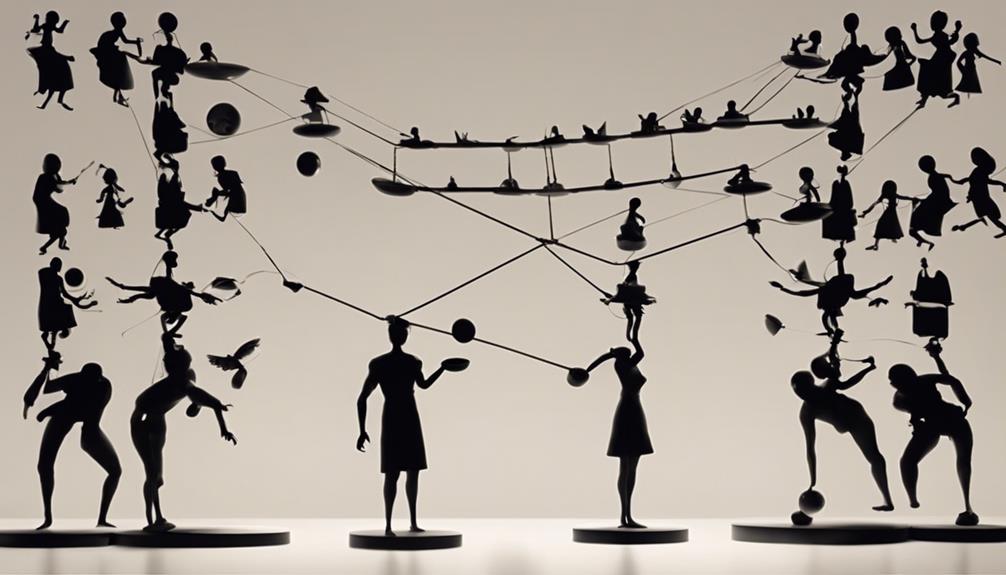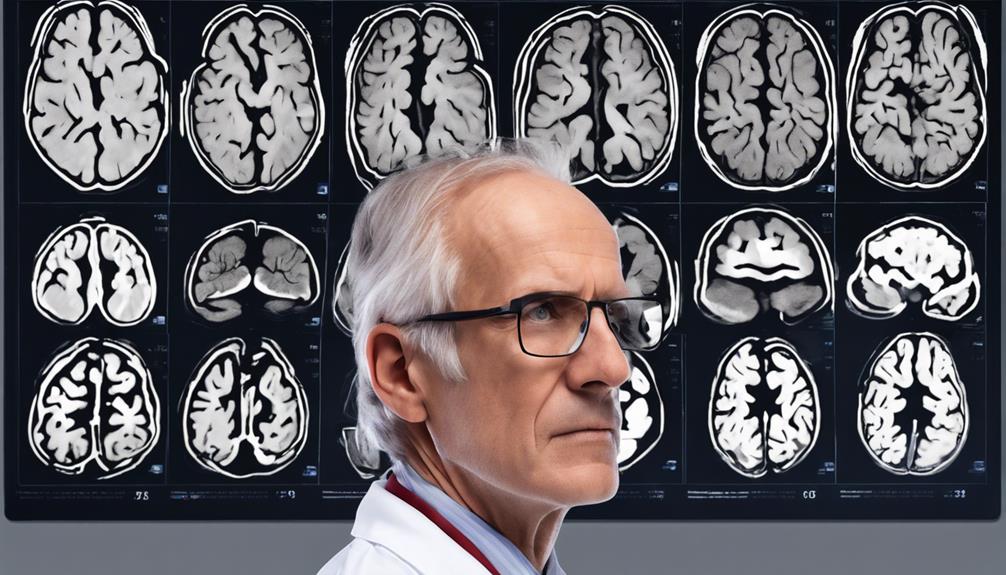A caregiver provides essential support to people facing challenges like age, illness, or disability. You assist with daily activities, personal care, and health monitoring. You help manage medications, guaranteeing they're taken correctly and on time. Nutritious meal preparation is also part of your role, tailored to individual dietary needs. Beyond physical support, you offer emotional companionship and guarantee a safe home environment. There's much more to explore about how caregivers make a difference in lives.
Key Takeaways
- Caregivers provide essential support for individuals facing challenges related to age, illness, or disability, ensuring comfort and dignity.
- They assist with personal care activities such as bathing, grooming, and dressing, respecting the individual's dignity and promoting independence.
- Caregivers monitor health, manage medication schedules, and communicate changes to healthcare providers to maintain accurate health records.
- They prepare nutritious meals tailored to dietary needs and encourage social interactions during mealtimes for emotional support.
- Caregivers offer companionship and engage seniors in physical activities to improve well-being and reduce the risk of accidents.
Definition of a Caregiver
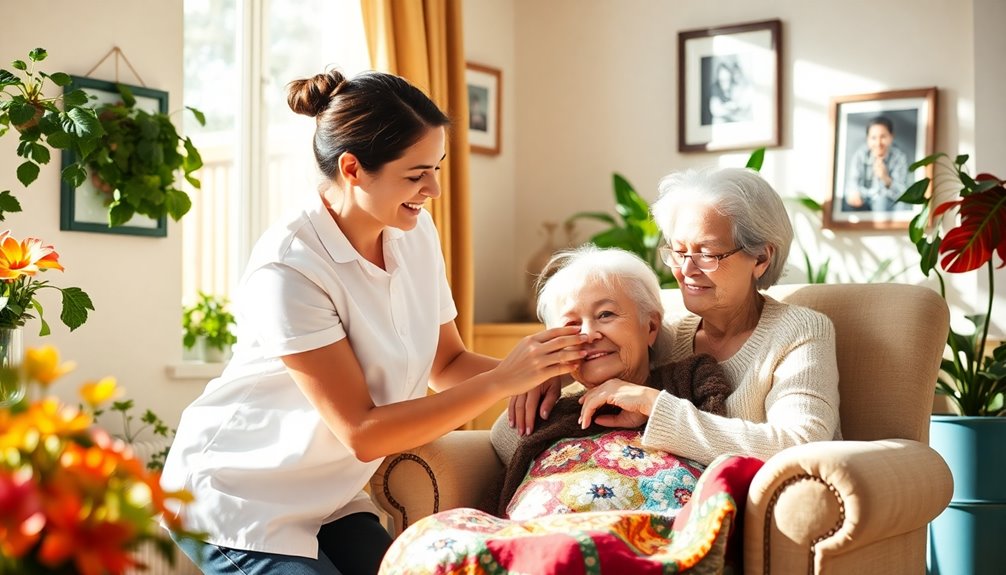
A caregiver is someone who provides essential support to individuals facing challenges like age, illness, or disability. Your role as a caregiver can vary widely based on the specific needs of the person in your care.
You might handle caregiving responsibilities such as personal care, health monitoring, and assisting with daily living activities. This can include meal preparation, medication management, and mobility assistance.
Beyond physical tasks, you also offer emotional support, helping to maintain a positive mindset and connection. Creating a safe environment is vital, and you adapt your approach to guarantee the well-being of those you care for.
Ultimately, your commitment to compassionate support makes a significant difference in their lives, fostering comfort and dignity amid challenges.
Main Duties and Responsibilities

Caregivers play an essential role in enhancing the quality of life for those they support by managing a variety of important duties.
Your caregiver duties and responsibilities include assisting clients with daily activities such as personal hygiene tasks like bathing and grooming. You provide mobility assistance to help them move safely around their homes, ensuring home safety and preventing falls.
Preparing nutritious meals tailored to dietary needs is another important aspect of your role. Additionally, you manage medications by organizing schedules and monitoring for side effects.
Emotional support is critical as well; engaging clients in meaningful activities helps combat loneliness and promotes mental well-being.
Personal Care Assistance

Providing personal care assistance is an essential aspect of a caregiver's role, focusing on the daily hygiene needs of elderly individuals.
In your caregiving duties, you'll help with personal care tasks like bathing, grooming, and dressing, ensuring they maintain their hygiene and comfort.
It's crucial to approach these tasks with kindness and patience, as this fosters emotional support and respects their dignity.
By empowering elderly individuals to perform activities of daily living (ADLs), you promote their independence while keeping an eye out for signs of skin integrity issues that could affect their overall health.
This trust-based relationship is key to enhancing their quality of life and ensuring they feel valued and cared for.
Medication Management

As a caregiver, you need to organize medication schedules to guarantee your client takes their meds on time and in the right doses.
It's crucial to monitor any side effects and stay alert for any changes in their health. This proactive approach not only helps prevent complications but also supports your client's overall well-being.
Organizing Medication Schedules
Organizing medication schedules is important for guaranteeing that medications are taken correctly and on time. As part of your caregiver job description, you'll need to understand each medication's purpose, side effects, and potential interactions.
By utilizing pill organizers or medication management apps, you can effectively manage medication schedules and minimize errors. Regular communication with healthcare professionals is essential for updating medication lists and addressing any care needs or concerns.
Documenting medication administration and any observed effects is significant for maintaining accurate health records, which aids in effective medical advocacy. Your role in providing compassionate care becomes even more critical when you guarantee that the person you're caring for adheres to their medication regimen safely and consistently.
Monitoring Side Effects
While managing medications, it's important to closely monitor any side effects that may arise. As a caregiver, you're responsible for observing clients for potential adverse reactions and documenting changes to report to healthcare professionals.
This proactive approach guarantees continuity of care and allows for timely adjustments to medication schedules when necessary.
Here are some key tasks you should focus on:
- Understand the purpose and side effects of each medication.
- Communicate regularly with healthcare professionals about any concerning symptoms.
- Maintain a secure and organized system for storing medications.
Nutritional Support and Meal Preparation

When it comes to nutritional support, meal planning is key to meeting your client's dietary needs and preferences.
You'll want to take into account any health conditions they've while crafting balanced meals that keep them energized.
Meal Planning Strategies
Effective meal planning is vital for caregivers aiming to provide nutritional support and enhance the overall well-being of their clients. By evaluating dietary needs and preferences, you can create enjoyable meal plans that meet nutritional guidelines. Focus on fresh, whole ingredients to guarantee balanced meals.
- Encourage social interactions during mealtimes to boost emotional support.
- Monitor for signs of malnutrition or dehydration to adjust meal plans accordingly.
- Utilize technology, like meal planning apps, to streamline your process.
As a senior caregiver, your role in meal planning directly impacts your clients' quality of life. By prioritizing nutritional support, you not only assist with the necessary caregiving tasks but also contribute considerably to their overall health and happiness. Additionally, incorporating meal replacement juices can help ensure clients receive essential nutrients while managing calorie intake.
Dietary Needs Consideration
Understanding your clients' dietary needs is essential for providing effective nutritional support and meal preparation. As a caregiver, you play an important role in crafting well-balanced meals tailored to the nutritional needs and dietary restrictions of elderly persons. This helps prevent malnutrition and guarantees overall health.
You assist with grocery shopping, stocking the pantry with healthy options that align with your client's preferences and health conditions. During mealtimes, you monitor intake, encourage social interaction, and confirm adequate calorie consumption, especially for those with decreased appetites.
It's significant to be aware of potential food interactions with medications, and collaborating with nutritionists can help create meal plans that cater to specific health needs, enhancing your clients' daily life. Additionally, incorporating celery juice powder into their diet can provide essential vitamins and hydration support.
Mobility Assistance
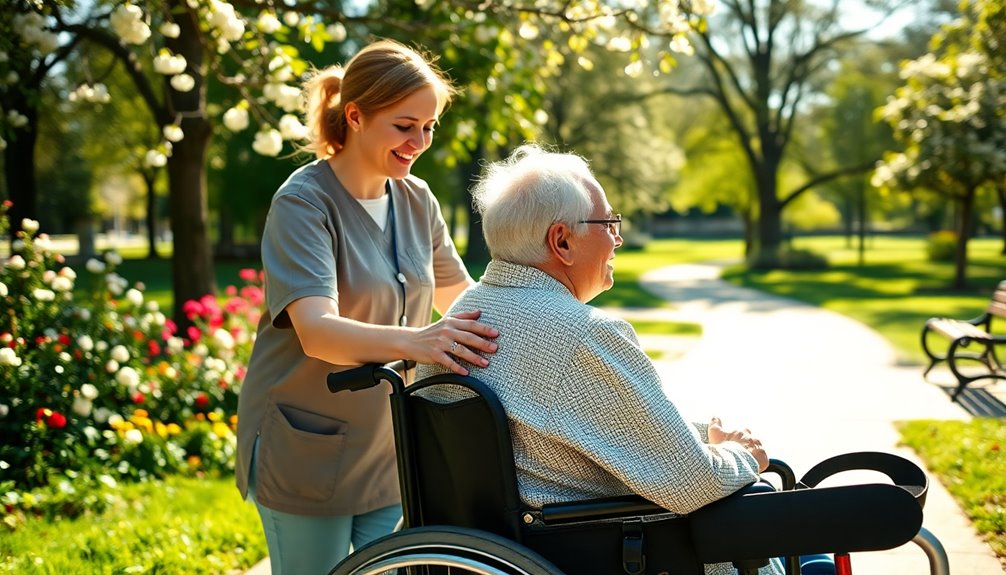
Mobility assistance is essential for seniors, as it helps them navigate their daily lives safely and independently.
Caregivers play a vital role in ensuring safety by providing support during transfers and monitoring for any risk of falls. They're trained to use mobility aids and techniques that promote safe movement, catering to each senior's unique needs.
- Help with transfers, like moving from bed to wheelchair
- Monitor signs of weakness or dizziness
- Engage clients in tailored physical activities
Emotional Support and Companionship
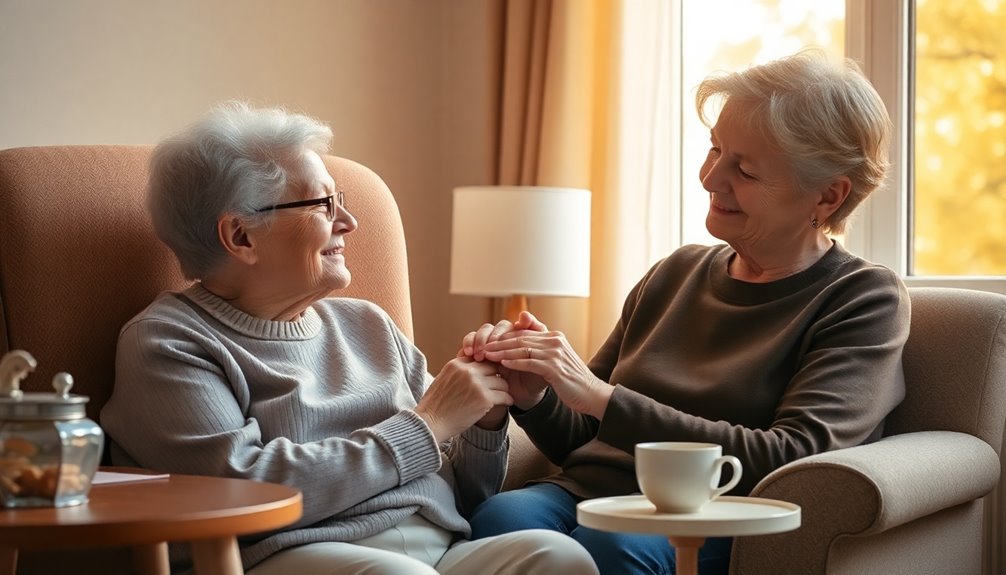
While caring for seniors involves many physical tasks, providing emotional support and companionship is equally vital. You help alleviate feelings of loneliness by engaging in meaningful conversations and fostering connections.
Through shared activities like games or hobbies, you enhance their quality of life and create lasting memories. Your role as a confidant allows seniors to feel understood and valued, which is essential for their emotional well-being.
Regular social interaction with you can lead to improved mental health outcomes, reducing the risk of cognitive decline. Additionally, your presence offers a sense of security and stability, contributing to a positive emotional environment.
Ultimately, your companionship enriches their lives and helps them navigate the challenges of aging.
Home Safety Management

Guaranteeing a safe home environment is essential for seniors, as even small hazards can lead to serious accidents. As a caregiver, you have specific responsibilities to meet the needs of your aging loved one.
Regular assessments of the home help identify potential risks like loose rugs or clutter. Implement safety measures and maintain cleanliness to promote a safe environment.
- Install grab bars in bathrooms.
- Guarantee adequate lighting throughout the home.
- Conduct regular checks of smoke and carbon monoxide detectors.
Additionally, educate your loved one about emergency preparedness, including having a well-stocked emergency kit and a clear evacuation plan. Engaging in regular physical activity can also help improve mobility and balance, reducing the risk of falls and accidents in the home.
Frequently Asked Questions
What Is the Main Responsibility of a Caregiver?
The main responsibility of a caregiver is to guarantee that individuals receive the assistance they need with daily activities.
You help with personal hygiene, meal preparation, and mobility support, always prioritizing comfort and dignity.
You also manage medication schedules, monitor health changes, and provide emotional support.
What Are Caregivers Not Allowed to Do?
Caregivers aren't allowed to administer medications unless they're properly trained or certified.
You can't make medical decisions for your client unless you have power of attorney.
Performing invasive procedures, like injections, is off-limits unless you're trained.
Handling financial transactions without authorization is also prohibited.
Most importantly, you must never engage in any form of abuse, neglect, or exploitation, as these actions violate both legal and ethical standards in caregiving.
How Much Do Family Members Get Paid for Caregiving?
When you take on the role of a family caregiver, your pay can vary. Typically, you might earn between $10 to $25 per hour, depending on your state and the care needs involved.
Some programs, like Medicaid's HCBS waivers, can compensate you for your services. Additionally, you could benefit from tax deductions or credits, which help with caregiving expenses.
Your training or certification level can also influence your potential earnings.
What Are Your Main Duties and Responsibilities of a Carer?
Imagine being the lifeline for someone who needs you—your main duties as a carer include providing personal care, managing medication schedules, and preparing nutritious meals.
You'll help clients with mobility, ensuring they move safely within their homes.
Additionally, you offer emotional support, engaging them in meaningful activities to combat loneliness.
It's not just about tasks; it's about enhancing their quality of life and fostering independence while creating a bond that truly matters.
Conclusion
In summary, caregivers play an essential role in enhancing the health and happiness of those they assist. By providing personal care, medication management, and emotional support, they foster a fulfilling environment for individuals in need. Their dedication to safety and well-being guarantees a stable and supportive setting. Ultimately, the compassionate commitment of caregivers creates a comforting connection, making a meaningful difference in the lives of others. Embrace the significant value they bring to our communities!


